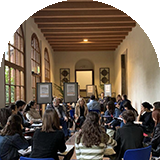Università Cattolica del Sacro Cuore Largo A. Gemelli, 1 - 20123 Milan
Nicola Palmarini
The Myth of Horizontal Career Paths: Do They Really Exist? Exist. And how. In an era of vertical specialization, mono-knowledge and debates on television. In a labor market that seems to be interested only in "competence" forgetting the plural, that is, forgetting the plurality of our natural diversity, of our being what we are by the sum and not by subtraction of interests and abilities, not only is it still possible to look at the things of the world "through", but today it is more necessary than ever.
When I chose to major in Political Science, I knew exactly that I wanted to do what I'm doing today, even if I didn't know exactly what form it would take, nor how I could define it. I just needed someone, my University, a fundamental choice, to show me how my not-being-one-thing-could be organized in a harmonious form of knowledge construction. As soon as I graduated and with a train already booked to go to Rome to take the competition for Deputy Commissioner of Police, I agreed to do an interview in an advertising agency because it was impossible and unfair to resist my passion - writing, creating, inventing. I gave up the uniform and started as a copywriter dealing with everything: from bras, to shipping, from razor blades, to bio-plastic. Different agencies, campaigns, experiences, products after – the launch of the Internet in Italy above all – and with the title of Creative Director I joined IBM where, within an ante-litteram open lab called Business Innovation Centers, they were looking for a "horizontal" figure who could interact with customers to develop integrated communication, user-experience, technology and strategy projects. Something usual today, exceptional then. I've been working – digitally – on trains and e-commerce, trading and tiles, theatres or how to make cities smarter. I started studying accessibility issues and dealing with self-driving cars, mobile, the Internet of Things and, above all, how the multifaceted and unstoppable technological evolution could help the most fragile people to support their independence and preserve their dignity. That is my real specialization today.
In the meantime, I gave life to the strategy on IBM Italia's social channels, I took care of the brand, I dealt with collaboration strategies, but I never stopped directly experiencing what good could be done with technology while maintaining a role, that of Director of the Human Centric Solution Center of IBM Europe, which allowed me to be able to "cross" the skills, skills, business models, roles. And to try all this in the field.
I left IBM in 2014 to lead the Tinaba.com team with Matteo Arpe, I was one of the founding members of the Talent Garden Innovation School, I was an advisor to Stentle, until I was called by IBM Research, in Cambridge, Massachusetts, to build the global practice of artificial intelligence for active aging where I led a team of 20 people for three years.
Today I work at the MIT IBM Watson AI lab, a $250 million partnership between academia and industry dedicated to the responsible development of artificial intelligence where, in addition to being Program Manager, I deal with ethics in the AI Lab without, of course, giving up my role as subject matter expert in aging and longevity.
I've written four books, the last one on the possibilities offered by research to perhaps live forever, and I founded a non-profit in New York dedicated to supporting women over 55 in their life and career transitions.
Is that the end of it? I don't think so. As they say, you have to be careful with your dreams: maybe one day they really come true.






